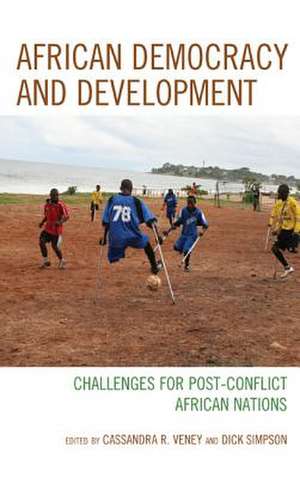African Democracy and Development
en Limba Engleză Paperback – 15 mai 2014
| Toate formatele și edițiile | Preț | Express |
|---|---|---|
| Paperback (1) | 434.30 lei 6-8 săpt. | |
| Rowman & Littlefield – 15 mai 2014 | 434.30 lei 6-8 săpt. | |
| Hardback (1) | 793.93 lei 6-8 săpt. | |
| Rowman & Littlefield – 12 oct 2012 | 793.93 lei 6-8 săpt. |
Preț: 434.30 lei
Preț vechi: 564.03 lei
-23% Nou
Puncte Express: 651
Preț estimativ în valută:
83.10€ • 90.55$ • 70.03£
83.10€ • 90.55$ • 70.03£
Carte tipărită la comandă
Livrare economică 23 aprilie-07 mai
Preluare comenzi: 021 569.72.76
Specificații
ISBN-13: 9780739197998
ISBN-10: 0739197991
Pagini: 306
Ilustrații: 4 black & white halftones, 3 tables
Dimensiuni: 152 x 226 x 25 mm
Greutate: 0.48 kg
Editura: Rowman & Littlefield
ISBN-10: 0739197991
Pagini: 306
Ilustrații: 4 black & white halftones, 3 tables
Dimensiuni: 152 x 226 x 25 mm
Greutate: 0.48 kg
Editura: Rowman & Littlefield
Notă biografică
Cuprins
Part I: Demobilization and Reconstruction
Chapter 1: Introduction
Cassandra R. Veney
Chapter 2: No Justice, No Peace: The Elusive Search for Justice and Reconciliation in Sierra Leone
Sylvia Macauley
Chapter 3: The Role of Ex-Combatants in Mozambique
Jessica Schafer
Chapter 4: Memory Controversies in Post-Genocide Rwanda: Implications for Peacebuilding
Elisabeth King
Part II: Institutional Challenges
Chapter 5: Land Reform, Social Justice, and Reconstruction: Challenges for Post-Genocide Rwanda
Helen Hintjens
Chapter 6: Elections as a Stress Test of Democratization in Societies: A Comparison of Liberia, Sierra Leone, and the Democratic Republic of the Congo
John Yoder
Chapter 7: Partners or Adversaries? NGOs and the State in Postwar Sierra Leone
Fredline A.O. M¿Cormack-Hale
Chapter 8: Chieftancy and Reconstruction in Sierra Leone
Arthur Abraham
Part III: Partnerships on the Way Forward
Chapter 9: The Role of African Diasporas in Reconstruction
Paul Tiyambe Zeleza
Chapter 10: The Role of the African Union in Reconstruction in Africa
Thomas Kwasi Tieku
Chapter 11: Governance Challenges in Sierra Leone
Osman Gbla
12: Challenges of Governance Reform in Liberia
Amos Sawyer
Part IV: The Future of Fragile States
Chapter 13: Achieving Development and Democracy
Dick Simpson
Descriere
This book is examines particular African countries that are recovering from civil wars that left thousands of their citizens internally displaced or as refugees in surrounding countries. The countries examined in the book are in the process of rebuilding institutions of governance that include judicial, legislative, and executive branches.
